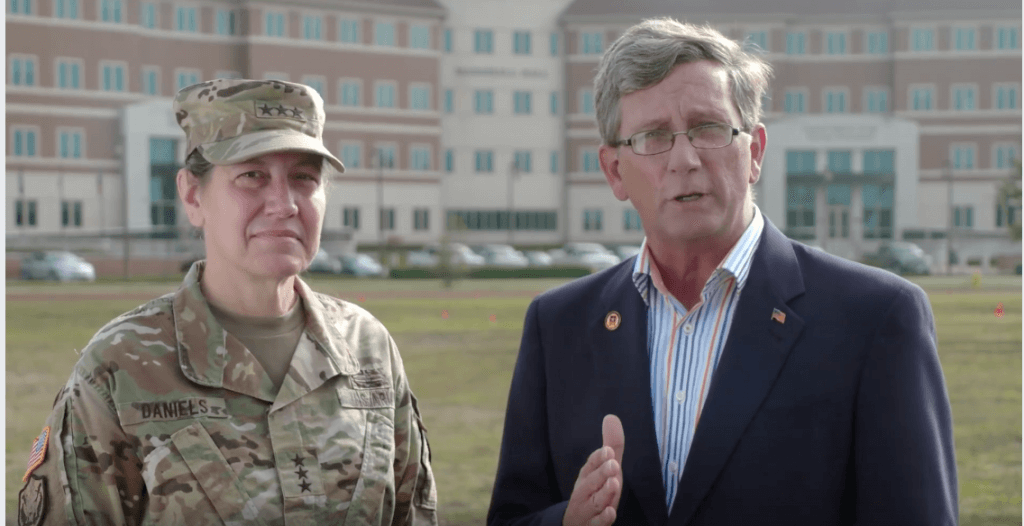The husband of the Chief of Army Reserve said he is focused on using his time in the senior spouse role to improve family readiness.
Retired Army Col. John McCarthy met his wife, Lt. Gen. Jody Daniels, through trail running. The couple married in 2013, but his familiarity with the military started long before that. The New Jersey-native enlisted in the New Jersey Army National Guard in 1980 as a minor student who needed his parents’ signature to forge ahead with his contract. McCarthy then completed basic training between his junior and senior years of high school, attaining his first rank before he even earned a diploma.
McCarthy experienced several transitions throughout his career that spanned more than 28 years, including going from enlisted to officer and switching from the Guard to active duty in 1985, until his retirement in 2013. He said “it was always the plan, to stay in until they kicked me out.”
His marriage to Daniels drove his decision to retire ahead of the three-decade mark, he adds, because her career was on an upward trajectory as she was offered a billet overseas.
“The two are definitely linked. Jody, my bride, had gotten a position in Stuttgart, Germany with Africa Command when I was still in. She asked if I wanted to come over [to Germany] … I could have stayed in until 30, but I wasn’t going to,” McCarthy said.
He was acclimated to the senior spouse role after receiving mentorship from Ginny Rodriguez, the wife of then-AFRICOM commander Gen. David Rodriguez.
“She taught me a lot about how to listen,” he said.
McCarthy knew from the onset that he wanted to be engaged in his new role, especially since it would afford him the opportunity to continue helping soldiers and their families. It took him five months to specifically land on how we would accomplish this: Soldier and Family Readiness Groups (SFRG).
“It’s broken — if I can help and motivate people to fix it in the next two years, then I’ll move on to something else,” he said. “And here’s why it’s my thing; I was talking to a brigade-level command sergeant major spouse. She said, ‘my husband [an Army reservist] got mobilized, he was out the door in seven days; he was supposed to be gone for six months and he was gone for 18 months.’ No one called her. No one from the unit, no other spouses. No one, and she had three young kids.”
McCarthy admits hearing her story angered him, but then it focused his resolve.
The SFRG is a unit’s commander’s program that provides a network of support and assistance for personal deployment preparedness and enhances soldier and family readiness, according to the Army’s website. The Army-sanctioned support groups are supposed to have a presence within every unit, CONUS and OCONUS. Levels of participation vary, as does the effectiveness, which is evident in the example cited by McCarthy. With such a vast AOR to evaluate, how will he begin to tackle his self-induced mission that started during a worldwide shutdown? Step one is to simply go back to Mrs. Rodriguez’s advice about listening, but in order to do that he needs Army families to use their voice.
“I need people to tell me what’s going on. Right now, the perception is there’s food insecurity, employment insecurity, but we don’t know. And I happen to have dinner with the person who can help that.
There are no problems in this world, there are only leader challenges. And if she [Lt. Gen. Daniels] pokes around and finds out, this challenge exists in New Jersey, and in California and in New Mexico, then she can tell her folks to find a programmatic solution to fix the challenge.”
As a former intelligence officer, McCarthy said information is a powerful tool in combatting some of the issues that are prevalent — and that works both ways. He wants to be useful in disseminating resources across the Army Reserve, but he emphasizes the foundational work begins with facetime with soldiers and family members. The pandemic has limited in-person opportunities, but that has not stopped both McCarthy and Daniels from being active on virtual platforms. He plans to ramp up local visits as restrictions continue to loosen.
As for what a successful run will look like for him? McCarthy has set a pretty high bar, stating “if every unit, down to the company level, has a vibrant and active SFRG.”

